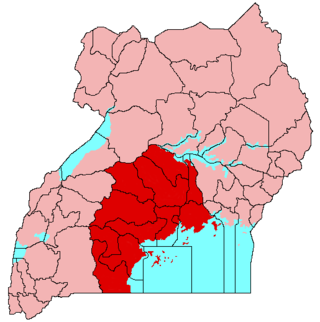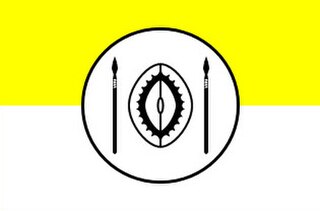See also
- Uganda Independence Conference, held at Marlborough House in June 1962
The Ugandan Constitutional Conference, held at Lancaster House in the autumn of 1961, was organised by the British Government to pave the way of Ugandan independence.
The Conference opened on 18 September 1961 [1] and concluded on 9 October. [2] It was convened to discuss the Report of the Uganda Relationships Commission, which had been tasked with "consider[ing] the future form of government best suited to Uganda the question of the relationship between the Central Government and the other authorities in Uganda" [3] and had reported in June. [1] In addition to UK Government Ministers (including the Secretary of State for the Colonies, Ian Macleod), the conference was attended by representatives of the colonial administration (headed by Sir Frederick Crawford, then Governor of Uganda), Baganda, the Democratic Party, the Uganda People's Congress (UPC) and others. [4] Milton Obote and the honourable A.G. Mehta were the lead representatives for the UPC. [5]
The main issue facing the conference was the status afforded to the different historic kingdoms of Uganda (and in particular the Kingdom of Buganda) in exchange for them recognising the existence of the new state of Uganda, of which they would only be one part. In addition, the Kingdom of Bunyoro only agreed to participate in the Conference if the disputed status of the "lost counties" was discussed. When, during the Conference, Macleod suggested that the referendum envisaged by the Relationships Commission could not proceed given the lack Bugandan support, instead proposing the establishment of a further Commission of Privy Councillors (the Molson Commission), Bunyoro's delegates walked out. [6]
The recommendations of the conference resulted in the Buganda Agreement of 1961, which supplanted the Buganda Agreement of 1955, as well as the first Ugandan Constitution.

Uganda, officially the Republic of Uganda, is a landlocked country in East Africa. The country is bordered to the east by Kenya, to the north by South Sudan, to the west by the Democratic Republic of the Congo, to the south-west by Rwanda, and to the south by Tanzania. The southern part of the country includes a substantial portion of Lake Victoria, shared with Kenya and Tanzania. Uganda is in the African Great Lakes region, lies within the Nile basin, and has a varied but a generally modified equatorial climate. It has a population of around 49.6 million, of which 8.5 million live in the capital and largest city of Kampala.

Apollo Milton Obote was a Ugandan political leader who led Uganda to independence from British colonial rule in 1962. Following the nation's independence, he served as prime minister of Uganda from 1962 to 1966 and the second president of Uganda from 1966 to 1971, then again from 1980 to 1985.

Buganda is a Bantu kingdom within Uganda. The kingdom of the Baganda people, Buganda is the largest of the traditional kingdoms in present-day East Africa, consisting of Buganda's Central Region, including the Ugandan capital Kampala. The 14 million Baganda make up the largest Ugandan region, representing approximately 16% of Uganda's population.

The Protectorate of Uganda was a protectorate of the British Empire from 1894 to 1962. In 1893 the Imperial British East Africa Company transferred its administration rights of territory consisting mainly of the Kingdom of Buganda to the British government.

The history of Uganda from 1963 through 1971 comprises the history of Uganda from Ugandan independence from the United Kingdom to the rise of the dictator Idi Amin.

Kabaka Yekka, commonly abbreviated as KY, was a monarchist political movement and party in Uganda. Kabaka Yekka means 'king only' in the Ganda language, Kabaka being the title of the King in the kingdom of Buganda.

The Constitution of Uganda is the supreme law of Uganda. The fourth and current constitution was promulgated on 8 October 1995. It sanctions a republican form of government with a powerful President.
The military history of Uganda begins with actions before the conquest of the country by the British Empire. After the British conquered the country, there were various actions, including in 1887, and independence was granted in 1962. After independence, Uganda was plagued with a series of conflicts, most rooted in the problems caused by colonialism. Like many African nations, Uganda endured a series of civil wars and coup d'états. Since the 2000s in particular, the Uganda People's Defence Force has been active in peacekeeping operations for the African Union and the United Nations.
The Buganda Crisis, also called the 1966 Mengo Crisis, the Kabaka Crisis, or the 1966 Crisis, domestically, was a period of political turmoil that occurred in Buganda. It was driven by conflict between Prime Minister Milton Obote and the Kabaka of Buganda, Mutesa II, culminating in a military assault upon the latter's residence that drove him into exile.

The Chiefdom of Kooki, also known as the Kooki chiefdom, was a pre-colonial African kingdom located within present-day Rakai District of Uganda that existed from approximately 1740 until 1896. The kingdom ceased to exist as an independent state in 1896 when it merged into the British Protectorate of Buganda. Its royal line still continues to this day as a Chiefdom, and is currently led by The Kamuswaga Apollo Sansa Kabumbuli II a hereditary Saza Chief on behalf of the Kabaka of Buganda. In 27 July 2015, the Kooki Kingdom declared independence from Buganda but it wasn't recognized by Buganda or Uganda.

The history of Buganda is that of the Buganda kingdom of the Baganda people, the largest of the traditional kingdoms in present-day Uganda.
The Uganda Legislative Council (LEGCO) was the predecessor of the Parliament of Uganda, prior to Uganda's independence from the United Kingdom. LEGCO was small to start with and all its members were Europeans. Its legislative powers were limited, since all important decisions came from the British Government in Whitehall.
Kirya Balaki Kebba the ex-rebel leader now-defunct rebel Uganda Freedom Movement who was kidnapped by security agents from Jamuhuri estate in Nairobi while in exile in the Republic of Kenya and brought back to Uganda. Kirya Balaki Kebba was acquitted of Treason charges in 1983 but was detained.

The lost counties referendum of November 1964 was a local referendum held to decide whether the "lost counties" of Buyaga and Bugangaizi in Uganda should continue to be part of the Kingdom of Buganda, be transferred back to the Kingdom of Bunyoro, or be established as a separate district. The electorate, consisting of the residents of the two counties at the time of independence, voted overwhelmingly to be returned to Bunyoro.
The Uganda Relationships Commission, also known as the Munster Commission, was a body established by the Government of the United Kingdom to make recommendations on the best form of government for an independent Uganda.
The Kabaka crisis was a political and constitutional crisis in the Uganda Protectorate between 1953 and 1955 wherein the Kabaka Mutesa II pressed for Bugandan secession from the Uganda Protectorate and was subsequently deposed and exiled by the British governor Andrew Cohen. Widespread discontent with this action forced the British government to backtrack, resulting in the restoration of Mutesa as specified in the Buganda Agreement of 1955, which ultimately shaped the nature of Ugandan independence.

Grace Stuart Katebariirwe Ibingira was a Ugandan lawyer and politician.
Michael Kintu was a Ugandan politician who served as Katikkiro of the Kingdom of Buganda from 1955 to 1964.

Ugandan nationality law is regulated by the Constitution of Uganda, as amended; the Uganda Citizenship and Immigration Control Act; and various international agreements to which the country is a signatory. These laws determine who is, or is eligible to be, a national of Uganda. The legal means to acquire nationality, formal legal membership in a nation, differ from the domestic relationship of rights and obligations between a national and the nation, known as citizenship. Nationality describes the relationship of an individual to the state under international law, whereas citizenship is the domestic relationship of an individual within the nation. Commonwealth countries often use the terms nationality and citizenship as synonyms, despite their legal distinction and the fact that they are regulated by different governmental administrative bodies. Ugandan nationality is typically obtained under the principal of jus sanguinis, i.e. by birth to parents with Ugandan nationality. It can be granted to persons with an affiliation to the country, or to a permanent resident who has lived in the country for a given period of time through naturalisation or registration.

A. G. Mehta was a Ugandan member of parliament, barrister and the eldest son of a prominent Indian industrialist. The Honourable A.G. Mehta was elected as the first Asian-Indian mayor of Uganda's capital Kampala in 1968 and was a close colleague of Uganda's first prime minister Milton Obote; with whom he jointly fought for the country's independence at the Uganda Constitutional Conference in 1961. He is credited with drafting elements of what would become the first Constitution of Uganda.